Thai pig farmers utilize modern techniques and practices to ensure efficient production and maintain domestic and international demand training programs and educational initiatives that help improve their skills and knowledge. The market opportunities for Thai pig farmers are promising, with an increasing domestic and international demand. Pig farming is important in Thailand, contributing significantly to the country’s economy and food security.
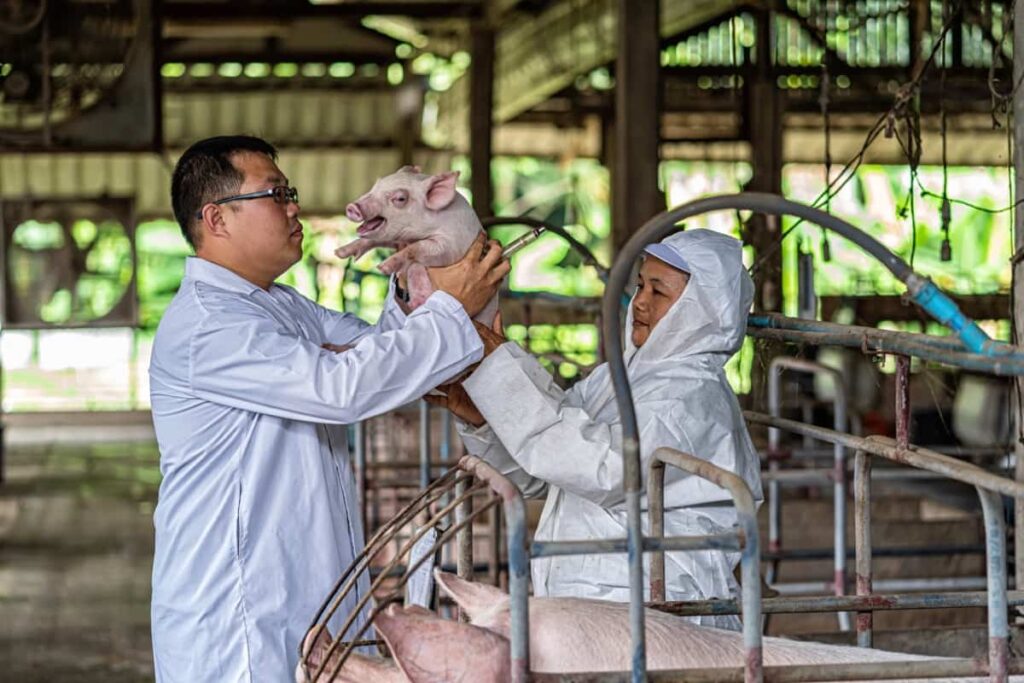
Additionally, pig farming contributes to sustainable agricultural practices by utilizing organic waste as feedstock for pigs. Sustainable practices play an important role in Thai pig farming. Many farmers use organic waste management systems to minimize environmental impact while maximizing resource efficiency. Pig farming in Thailand offers a promising opportunity for farmers and entrepreneurs.
Pig Breeds Available in Thailand
The two categories of pig breeds used in Thailand are the native breeds, for example, Raad or Ka Done, Puang, Hailum, Kwai, and wild pigs; and the main commercial breeds, including the Large White, Landrace, Duroc, and hybrids of these types. Pig farming in Thailand offers a wide variety of pig breeds. One popular breed is the landrace, particularly in Central Thailand. Known for their adaptability and high fertility rates, these pigs are well-suited for the local climate and conditions.
Another commonly used breed in Thai pig farming is the Large White. These pigs are known for their lean meat production and efficient feed conversion rates, making them a profitable choice for farmers. The Duroc breed is also popular among pig farmers in Thailand. With its excellent meat quality and growth rate, this breed is highly sought after by consumers and commands a higher market price.
In addition to these commercial breeds, there are native breeds such as Raad or Ka Done, Puang, Hailum, Kwai, and even wild pigs that are utilized in certain regions of Thailand. These native breeds contribute to the diversity of the industry and offer unique characteristics that cater to specific market demands.
Advantages of Pig Farming in Thailand
The demand for pork products is consistently high both domestically and internationally. This ensures a stable market for pig farmers, providing farmers with a reliable source of income. Additionally, pig farming requires relatively low investment costs compared to other livestock ventures. Affordable land and labor availability further contribute to the cost-effectiveness of starting a pig farm in Thailand.
In case you missed it: How to Start Dragon Fruit Farming/Pitaya in Thailand: A Step-by-Step Guide for Beginners
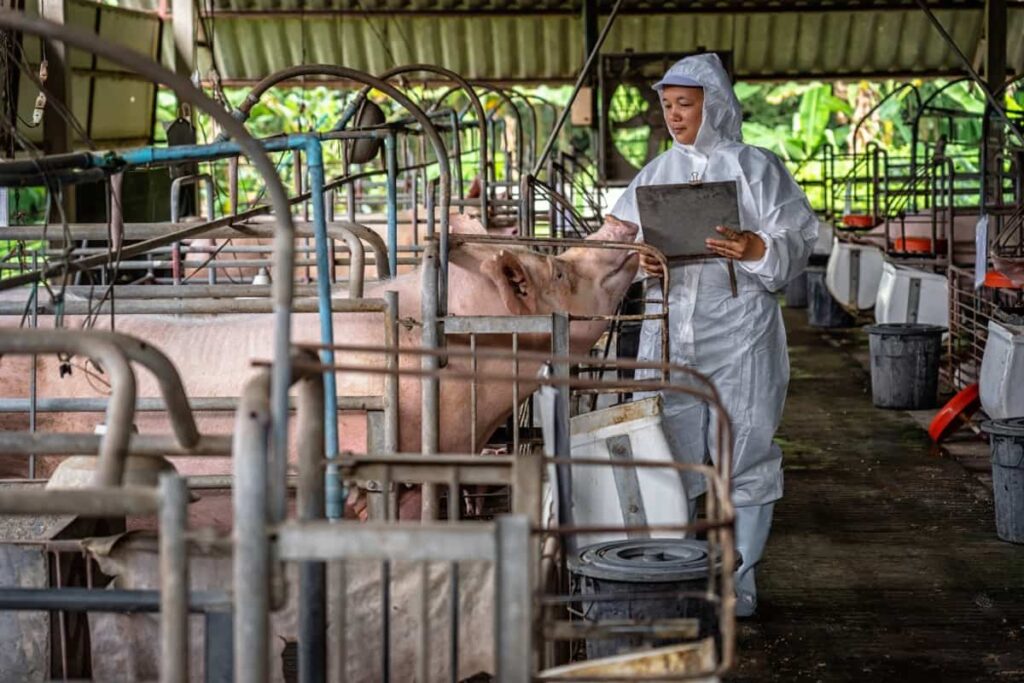
Furthermore, pigs are known for their fast growth rate and high reproductive capacity. This means that farmers can quickly expand their operations and increase their profits within a relatively short period. Moreover, pig manure can be used as organic fertilizer, benefiting crop production on farms, or sold as an additional source of income.
This promotes sustainability by reducing waste and increasing resource efficiency. Thai pig farmers can access government support programs to enhance their businesses’ productivity and profitability. These initiatives provide financial assistance, technical training opportunities, and resources needed for successful pig farming ventures.
Sustainable Practices in Thai Pig Farming
Thai pig farmers are increasingly adopting sustainable practices to ensure the viability of their farms and minimize environmental impact. One such practice is the implementation of waste management systems. Farmers can prevent water pollution and soil degradation by properly managing pig waste.
Innovative techniques like anaerobic digestion are being used to convert pig manure into biogas, which can be used for electricity generation or other energy needs on the farm. Additionally, some farmers have started implementing rotational grazing systems, where pigs are moved from one pasture to another periodically. This allows the land to rest and regenerate naturally, preventing overgrazing and soil erosion.
Water conservation is another aspect of sustainable pig farming in Thailand. Farmers use drip irrigation and rainwater harvesting technologies to optimize water usage and reduce dependency on groundwater sources. Moreover, many pig farms in Thailand embrace organic farming practices by avoiding chemical inputs such as pesticides and antibiotics whenever possible. Instead, they focus on natural alternatives like herbal supplements and probiotics to maintain the health of their animals without compromising food safety standards.
License and Permissions Required for Pig Farming in Thailand
One of the key licenses needed for pig farming in Thailand is the Livestock Registration Certificate. This certificate is issued by the Department of Livestock Development (DLD) and proves that your farm meets all legal requirements for operating a pig farming business. Additionally, you must apply for an Environmental Impact Assessment (EIA) if your farm exceeds certain thresholds specified by the government.
In case you missed it: Month-wise Pig Farm Maintenance: Effective Operation for Better Profits
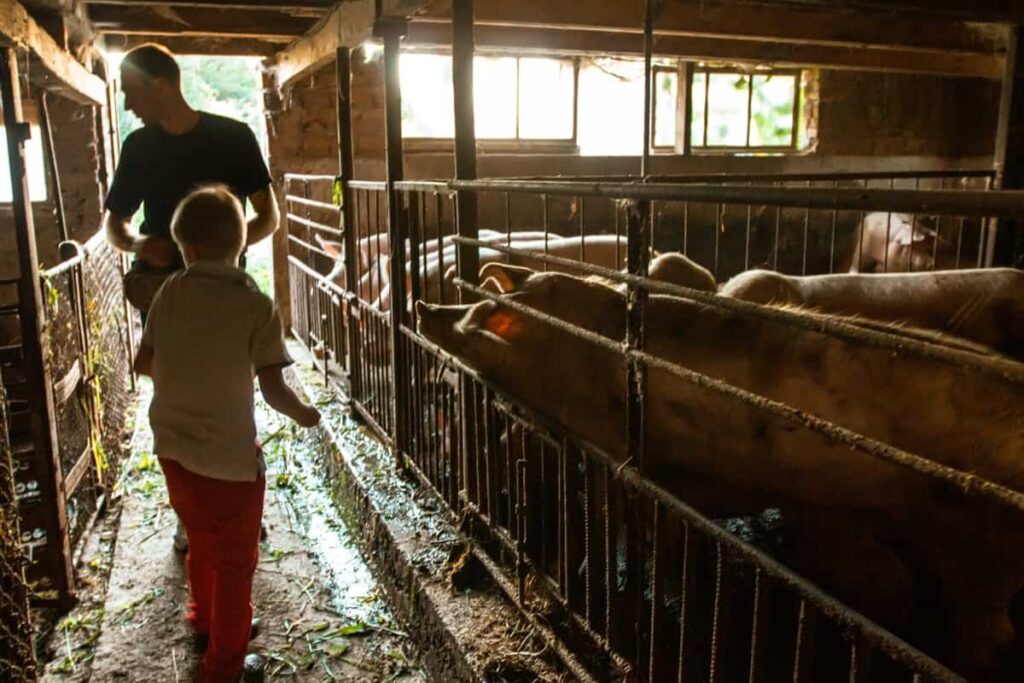
The EIA process evaluates potential environmental impacts caused by your pig farming activities and helps determine appropriate mitigation measures. Furthermore, obtaining a permit from local authorities for land use is important if you establish a large-scale pig farm. This permit ensures that your chosen location is suitable for animal husbandry activities and complies with zoning regulations. In addition to these licenses and permits, it’s crucial to comply with other relevant animal health and welfare laws, waste management, biosecurity measures, and food safety standards.
Government Support for the Pig Farming Industry
The pig farming industry in Thailand receives significant support from the government, which recognizes its importance to the country’s economy and food security. The Thai government has implemented various policies and initiatives to encourage and sustain the growth of this sector. One main support is through financial assistance programs. The government offers loans and grants tailored for pig farmers, helping them with start-up costs, infrastructure development, and equipment purchasing.
These financial incentives enable farmers to expand their operations and improve their productivity. Additionally, the government provides training and education programs for pig farmers. These programs aim to enhance their knowledge of modern farming techniques, animal health management, biosecurity measures, and environmental sustainability practices. By equipping farmers with these skills, they can optimize production efficiency while minimizing risks.
Furthermore, regulatory frameworks have been established by the government to ensure proper licensing and permissions for operating a pig farm. This helps maintain high hygiene standards, disease prevention measures, waste management protocols, and animal welfare practices within the industry. Moreover, the government supports research projects that improve breeding techniques, cultivation methods, biosecurity strategies, and feed formulations specific to local conditions.
Pig Farming Techniques Used in Thailand
One common technique used in pig farming in Thailand is deep litter bedding, where a layer of clean straw or sawdust is spread on the floor of the pig pen. This helps absorb moisture and waste, keeping the pigs comfortable and reducing odors. Thai pig farmers also utilize modern technology in their operations. Automated feeding systems are often implemented to provide precise amounts of feed at regular intervals, ensuring optimal nutrition for the pigs.
Also, temperature control systems help regulate heat and humidity to maintain a healthy animal environment. To minimize disease outbreaks, strict biosecurity measures are followed in Thai pig farms. This includes regularly disinfecting equipment and facilities, restricting access to outsiders, and monitoring animal health closely. Recently, some Thai pig farmers have focused more on organic farming methods. These farmers prioritize using natural feeds free from chemicals or antibiotics and emphasize providing ample space for outdoor activities.
Pig Feed Production in Thailand
The quality and nutritional value of the feed directly impact pigs’ health, growth, and productivity. Recently, a significant focus has been on improving feed production techniques to ensure optimal results. Thailand is known for its abundant agricultural resources, making it a good location for producing high-quality pig feed.
In case you missed it: Pig Farming Project Report: Investment, Profit for 10, 20, 50, 100, and 500 Pigs/Hogs
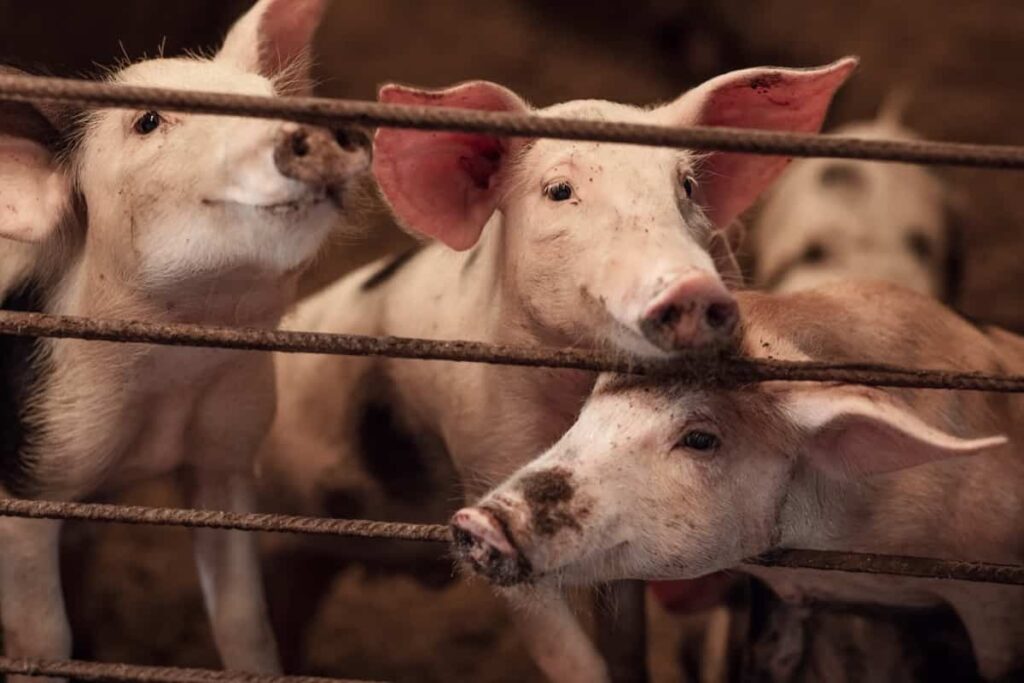
Local farmers have access to various ingredients such as maize, soybean meal, rice bran, cassava chips, and fishmeal that are used in formulating balanced diets for pigs. Large commercial producers and small-scale farmers employ different production ways to meet Thailand’s growing demand for pig feed. Some produce their feed on-site using locally available ingredients, while others rely on professional manufacturers to produce customized feeds based on specific requirements.
In addition to sourcing quality ingredients for pig feed production, Thai farmers also pay attention to proper storage and processing techniques. Overall, the pig feed production industry continues to evolve with new research findings, resulting in improved formulations and better animal performance.
Water Management in Thai Pig Farms
With the country’s hot and humid climate, ensuring an adequate and clean water supply is essential for the health and well-being of the pigs. Thai pig farmers employ various techniques to manage water efficiently on their farms. One common practice is automatic watering systems that provide the pigs with continuous fresh water. These systems are designed to minimize wastage and ensure that each pig can access clean drinking water.
Additionally, many farmers collect rainwater during the wet season for use during dry periods. This helps conserve natural resources while reducing dependency on external water sources. Proper waste management is another aspect of water management in Thai pig farms. Farmers can prevent contamination of water sources with manure runoff by implementing effective waste disposal systems. This protects the environment and prevents diseases from spreading among the pigs.
Regular health monitoring and water quality testing are also important practices Thai pig farmers follow. Ensuring that the water provided to the pigs meets safety standards helps maintain their health and reduces risks associated with contaminated or inadequate drinking water. Efficient water management practices contribute significantly to sustainable and responsible pig farming in Thailand, promoting animal welfare, protecting environmental resources, and ensuring a high-quality product for consumers.
Challenges Faced by Pig Farmers in Thailand
One major challenge is the outbreak of diseases like African swine fever and foot-and-mouth disease. These can devastate pig populations and result in significant financial losses for farmers. Another challenge is the increasing cost of production. The price of feed, veterinary care, and other inputs has been steadily rising over the years. This puts pressure on pig farmers to reduce costs without compromising the health and well-being of their animals.
Additionally, environmental concerns pose a challenge for pig farmers in Thailand. Proper waste management is essential to prevent pollution and minimize negative impacts on surrounding ecosystems. Compliance with regulations regarding waste disposal can be costly and time-consuming for farmers. Fluctuating market prices can make it difficult for pig farmers to plan their operations effectively. Market demand may vary throughout the year, affecting pricing strategies and sales volumes.
In case you missed it: How to Start Sustainable Pig Farming: Business Plan, Benefits, and Requirements
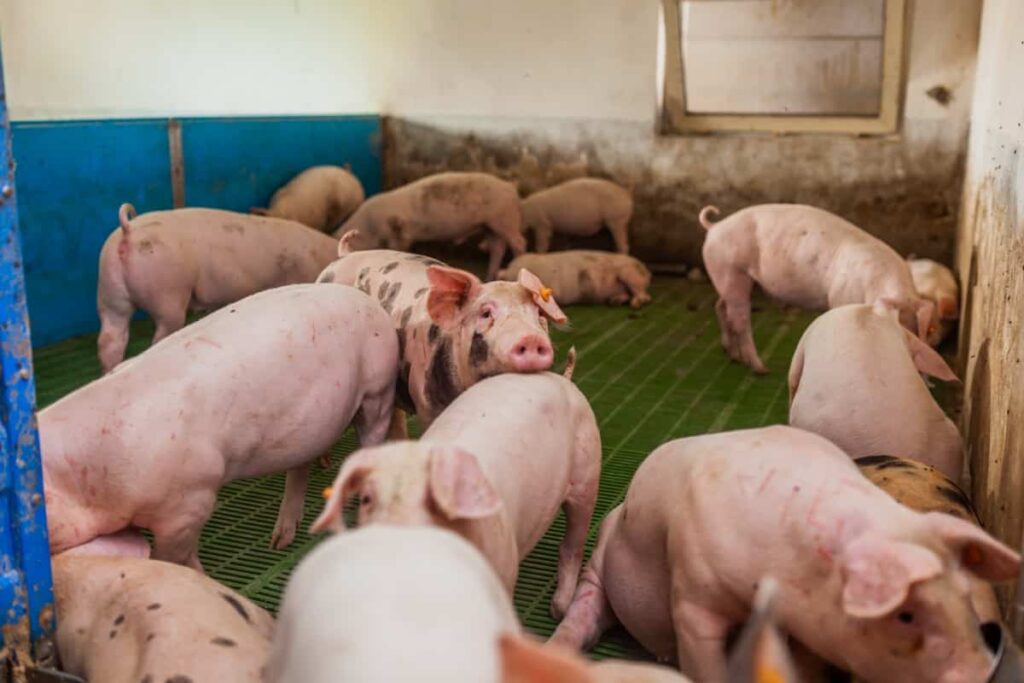
Tips for Success in Pig Farming in Thailand
Proper Planning: Creating a business plan before venturing into pig farming is crucial. This should include details about the number of pigs you want to raise, the type of breed you will choose, and the facilities and equipment needed.
Secure Land and Facilities: Find suitable land for your pig farm that provides enough space for housing the pigs and room for expansion. Build or renovate structures like barns or sheds with proper ventilation and drainage systems to ensure the pigs’ comfort.
Choose the right breed: When starting a pig farm in Thailand, selecting the right breed of pigs that are well-suited for local conditions and have good growth potential is crucial. Consider factors such as adaptability, disease resistance, and market demand.
Provide proper housing: Ensure your pig farm has adequate housing facilities that provide shelter from harsh weather conditions and protect the pigs from predators or diseases. Proper ventilation and sanitation are also essential to maintain a healthy environment.
Good Animal Welfare Practices: Caring for your pigs’ health and welfare is essential for success in this industry. Please provide them with clean water, nutritious feed, adequate space for movement, and shelter that protects them from harsh weather conditions.
Disease Prevention: Implement strict biosecurity measures to protect your pigs from diseases. Maintain a clean environment and ensure proper sanitation practices within the farm premises.
Monitoring Feed Quality: Pay attention to the quality of feed you provide to your pigs, as it directly affects their growth rate and overall health. Consult with nutrition experts or veterinarians to develop an appropriate feeding program based on their nutritional requirements.
Regular Veterinary Check-ups: Schedule regular visits by a qualified veterinarian who can provide vaccinations, perform routine check-ups, and offer guidance on disease prevention strategies.
Marketing Strategies: Develop strong marketing strategies to sell your products efficiently. Consider partnering with restaurants or grocery stores that prioritize sourcing local produce.
Training and Education Programs for Pig Farmers
In Thailand, various initiatives aim to equip pig farmers with the necessary knowledge and skills to optimize their farming practices. One such program is the Pig Production Training Course offered by the Department of Livestock Development. This comprehensive course covers breeding, feeding, health management, biosecurity measures, waste management, and marketing strategies. The participants gain practical experience through hands-on training sessions conducted at model farms.
Additionally, agricultural universities and research institutions offer specialized courses on pig farming. These programs provide in-depth knowledge about advanced techniques like artificial insemination, genetic improvement, disease control measures, and efficient feed management. Industry associations also organize workshops and seminars where experts share insights into emerging trends in pig farming.
In case you missed it: How to Grow Pigeon Pea/Red Gram/Toor Dal: Cultivation Practices and Production Management
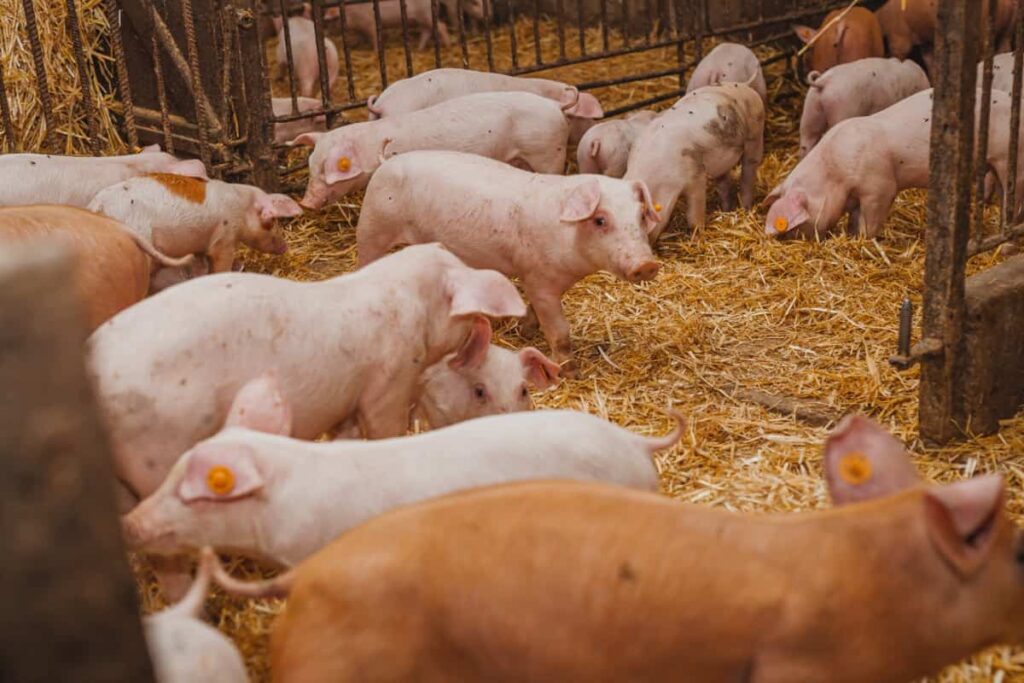
These events facilitate networking among farmers and provide valuable opportunities to learn from each other’s experiences. By participating in these training programs or accessing educational resources online, pig farmers can stay updated with the latest technological advancements, animal welfare practices, and market trends. This knowledge empowers pig farmers to make informed decisions that improve productivity while minimizing environmental impact.
Conclusion
Pig farming in Thailand has become a thriving industry, with farmers reaping the benefits of this lucrative venture. With a variety of pig breeds available, including native and commercial breeds, Thai farmers have plenty of options to choose from. Pig farming provides employment opportunities for rural communities, helping to alleviate poverty and improve livelihoods. Many small-scale farmers use pig rearing to generate income and sustain their families.
- Profitable Village Farming Business Ideas in 2024
- High-Yield Aquaculture: Fast-Growing Fish for Farming
- Effective Fish Pond Construction Techniques for Beginners
- Irrigation and Water Management in Pineapple Farming
- Blossom to Harvest: Mastering Flowering and Pollination in Papaya Farming
- Pig Fattening Essentials: From Selection to Sale for Beginners
- Raising Wagyu Cattle: A Complete Guide for Premium Beef Production
- Soil Types and Their Water Holding Capacity
- Optimizing Irrigation Schedules for Coconut Groves for Enhanced Yield
- Espresso Your Garden: Coffee Grounds for Healthier Acid-Loving Plants
- The Best Soil Mix for Snake Plants: How to Mix Your Own Snake Plant Soil
- Green Thumb Success: Expert Tips for Cultivating Greenhouse Beans All Year Round
- Bloom All Year Round: The Ultimate Guide to Indoor Hyacinth Care
- Eco-Friendly Gardening: How to Make Liquid Fertilizer from Kitchen Waste
- Ultimate Guide to Grow Anise in Pots: Explore Seed Propagation to Harvesting
- Guide to Raising Chester White Pigs: Discover Breed Facts to Growth Management
- Mastering the Elegance: The Ultimate Guide to Weeping Cherry Tree Care, Planting, and Maintenance
- Ultimate Guide to Planting Garlic in Grow Bags: Growing Strategies for Beginners
- How to Fix Spider Plant Leaf-Related Problems: Natural and Organic Remedies
- 10 Reasons Why Your Tulsi Plant is Shedding Leaves: Home Remedies and Solutions
- Optimizing Growth and Yield: The Advantages of Palm Bunch Ash Fertilizer
- Utilizing Neem Oil Extract as a Natural Pesticide for Hydrangea
- From Soil to Harvest: Various Ways in Which Farmers Can Use AI Tools
- Steps to Encourage and Induce Citrus Flowers: A Comprehensive Guide
- How to Fix Snake Plant Leaf-Related Issues: Natural and Organic Remedies
- Transform Your Garden into a Fragrant Oasis with Raat Ki Rani (Night Blooming Jasmine)
- Discover the Ideal Chicken Breeds for Philippine Farms
- How to Create a Poultry Egg Farm Business Plan for Profits
- Grow Lemon Cucumbers Like a Pro: Insider Techniques for Bountiful Yields
- Ultimate Guide to Caring for Your Pink Princess Philodendron: Tips for Thriving Variegation
- Areca Nut Profit Per Acre: Calculating Yield and Cost of Cultivation
- How Kaveri Chicken is Becoming a More Profitable Breed in Indian Backyards
- Transform Your Barn: 9 Steps to Convert a Horse Stall into a Chicken Coop
- Exploring Suffolk Sheep Disadvantages with Limitations and Challenges
- Guide to Solving Potted Lemon Tree Problems: How to Revive Lemon Tree in Containers
- Steps to Encourage Female Pumpkin Flowers: Best Strategies for More Flowers and High Yields
